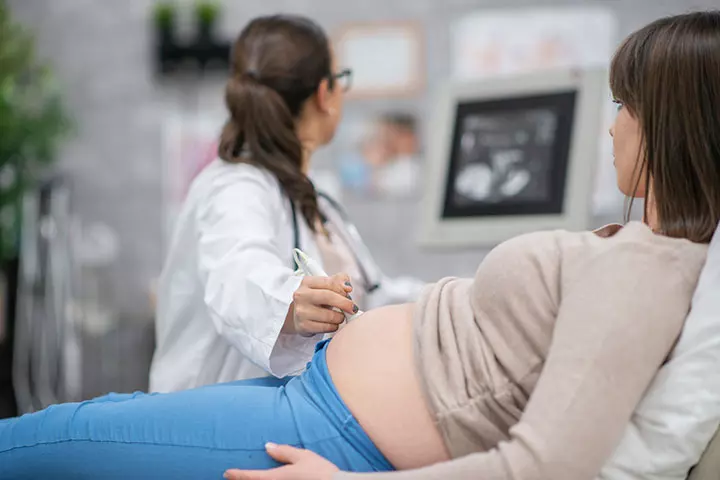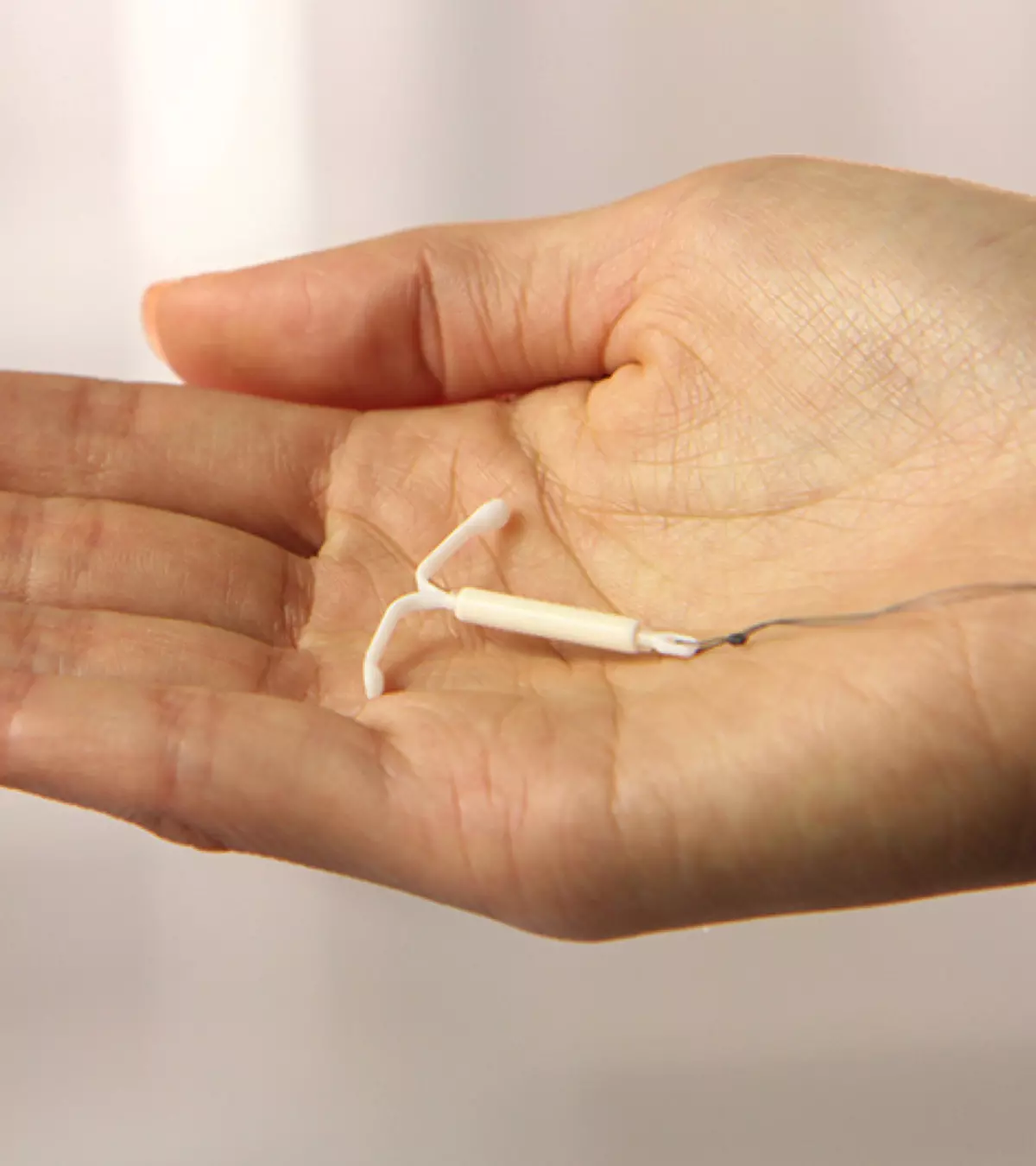
Image: Midjourney/ MomJunction Design Team
Upper stomach pain during pregnancy could develop due to the changes in the positions of the abdominal organs caused by the developing fetus. Other possible causes for upper stomach pain are gas, indigestion, etc. In addition, similar biochemical and physiological changes in the woman’s body may give rise to accompanying pregnancy symptoms such as digestive issues, bloating, cramps, aches, and nausea or morning sickness. However, these symptoms may vary from one woman to another (1).

Read about the factors that might cause upper stomach pain while pregnant and home remedies to manage the discomfort.
Key Pointers
- Upper stomach pain during pregnancy might occur when organs and tissues adjust to accommodate the baby.
- Growing fetus, acid reflux, stomach gas, and constipation are a few causes of pain.
- Light exercises, less spicy food, more water intake, more fiber in the diet, etc., can relieve the pain.
- Take advice from a doctor for severe pain as it may indicate underlying issues, such as ectopic pregnancy and placental abruption.
Is Upper Stomach Pain Common During Pregnancy?

Upper abdominal pain is a common complaint during pregnancy. As the fetus grows inside your belly, the organs and tissues adjust themselves to accommodate it and, in the process, may get pressed or stretched, causing upper abdominal discomfort.
It may be a sharp or dull pain, but it usually goes away with a little rest, a change in position, or passing stools or gas. However, according to a study, persistent or severe stomach pain may indicate an underlying problem (2).
What Causes Upper Stomach Pain When Pregnant?
Here’s a list of possible causes of upper stomach pain during pregnancy, along with their common symptoms, to help you identify and seek appropriate care if needed:
| Causes | Symptoms |
|---|---|
| Growing pains | Sharp pain and cramps in abdomen, upper stomach, and under breasts |
| Acid reflux | Severe upper abdomen pain |
| Stomach gas | Flatulence, bloating, belching |
| Constipation | Abdominal pain, discomfort |
| Cholestasis | Upper right stomach pain, itchiness in soles and palms, loss of appetite, nausea, dark urine, pale stool |
| Gallstones | Upper right abdominal pain, bloating, nausea, discomfort after meals |
| Pancreatitis | Dull upper abdominal pain radiating to back, nausea, vomiting |
| HELLP syndrome | Upper right or middle abdomen pain, face and hands swelling, nausea, vomiting, headache, , blurred vision, fatigue |
| Placental abruption | Stomach pain, possible vaginal bleeding |
| Ectopic pregnancy | Sharp pain or cramp on one side of the abdomen, vaginal bleeding |
Let’s go into the details here. Some organs get re-positioned during pregnancy. Conditions associated with these organs and the muscles and tissues of the upper stomach wall can contribute to pain in this region.
Common conditions that are not very serious and may be resolved with lifestyle and dietary changes are:
1. Growing pains
Ligaments in the torso often stretch to support the growing uterus, leading to sharp pains and cramps in various parts of the abdomen, including the pain in the upper stomach under the breasts. Drink plenty of water to relieve pain, use heat packs or warm baths, and support your belly with a pillow while sleeping. Gentle stretching, yoga, and prenatal massages under medical guidance can also be effective. If the discomfort continues or causes concern, contact your doctor (1) (3).
 Quick tip
Quick tip2. Acid reflux

The growing uterus pushes the stomach and intestines, causing compression and delayed gastric movements. It causes stomach acid to move up the food pipe and cause heartburn, chest discomfort, and a sour taste in the mouth. Its severe form is termed gastroesophageal reflux disorder (GERD).
It may cause severe upper abdomen pain, requiring medical attention. Antacids help treat this abdominal pain. Using antacids without proper guidance during pregnancy can be risky as overuse may not be safe. Therefore, it is important to consult your healthcare provider to know the safe medications during pregnancy (4).
3. Stomach gas
Gas during pregnancy is quite common. Increased levels of the hormone progesteroneiA female reproductive hormone that plays an important role in menstruation, pregnancy, and breastfeeding is often responsible for excess gas formation in the stomach. Progesterone relaxes the intestinal muscles and slows food movement and digestion, causing flatulence (gas build-up in the gut) and bloating. According to the American Pregnancy Association (APA), this issue can further aggravate later in pregnancy as the growing uterus puts additional pressure on the digestive system, potentially causing upper stomach pain. Home remedies such as reducing the intake of carbonated drinks and fried fatty foods and drinking plenty of water can help alleviate stomach gas (5).
Yelena Wheeler, a registered dietitian nutritionist from Los Angeles, California, says, “Indigestion and pain from gas bubbles may present themselves in the upper abdomen at times since the internal anatomy is being pushed around and changed by the growing fetus.”
4. Constipation
Irregular bowel movement, passing hard stools, straining during passing stools with abdominal pain, and stomach discomfort are all indicators of constipation during pregnancy. Less body movement, inadequate fluid intake, low fiber intake, relaxed intestinal muscles, iron supplements, and even mental stress may cause constipation when pregnant. Drinking plenty of water, eating fiber-rich foods like fruits, vegetables, and whole grains, and engaging in light exercises such as walking can help combat constipation during pregnancy (6).
Conditions that may harm the mother or baby and requires immediate medical attention are:
5. Cholestasis
Cholestasis may cause upper stomach pain during the second trimester, which may persist or worsen as the pregnancy progresses into the third trimester. It is a common liver disease in pregnancy caused due to reduced bile release from the liver. Bile builds up in the liver and causes malfunctions. The condition is seen in the late second trimester to the early third trimester and can complicate pregnancy. An identifying symptom is itchiness in palms and soles. Other symptoms include right upper quadrant abdominal pain, nausea, loss of appetite, dark urine, and pale stool (7). Blood tests, exploratory exams, or imaging tests such as CT scan or abdominal ultrasound can help diagnose the condition (8). This condition typically goes away after delivery, but if you suspect you may have cholestasis, speak to your doctor immediately.
6. Gallstones

Bile flow and clearance get restricted during pregnancy, increasing the risk of gallstone formation. The risk is further enhanced if you have high cholesterol, and it affects about one percent of pregnancies. As per a study published in the International Journal of Women’s Health, pain in the right upper abdomen with bloating, nausea, and abdominal discomfort after meals may indicate gallbladder stones. An ultrasound (ultrasonography or USG) is used for diagnosis. Persistent or severe symptoms may require medical assessment. Consult a healthcare provider for proper diagnosis and treatment (2).
Mother and blogger Tadeja Kovač was diagnosed with gallstones during pregnancy. Reflecting on her experience, she says, “I’ve visited the ER at 20 weeks of pregnancy. After an ultrasound and blood tests, they diagnosed my severe pain in the upper abdomen as a gallstone issue. It was too late for me to receive any treatment other than antibiotics and painkillers. So I was advised to follow the dietary advice and eat some pills in case of any additional colic attacks (i).”
7. Pancreatitis
It is the inflammation of the pancreas occurring mostly in the third trimester. Gallstones and high cholesterol are usually responsible for it. Dull upper abdominal pain radiating to the back along with sudden nausea and vomiting are the indicative signs. It is usually diagnosed through ultrasound and biochemical tests for pancreatic enzymes, such as amylaseiAn enzyme or a particular protein that aids in the digestion of carbohydrates and lipaseiA digestive juice necessary for the digestion of fats (2). While it is usually a self-limiting and benign condition manageable with rest, hydration, and dietary adjustments, severe cases may require medical interventions, such as hospitalization or surgical procedures, to address complications. Medical attention is essential if symptoms persist or worsen.
8. HELLP syndrome
HELLP stands for hemolysis (breakdown of red blood cells), elevated liver enzyme levels, and low platelet count. It is a life-threatening complication common in pregnant women with preeclampsiaiA pregnancy disorder characterized by high blood pressure, water retention, and protein content in urine or eclampsiaiA condition where women with preeclampsia experience seizures or fall into a coma . Symptoms include pain in the upper right or middle abdomen, swelling in hands and face, fatigue, headache, blurred vision, excess weight gain, nausea, and vomiting (9).
It is usually diagnosed through physical exams and blood tests such as liver function tests, kidney function tests, and complete blood count tests. HELLP syndrome can result in serious health risks for both the birthing person and the baby (10).
9. Placental abruption
The detachment of the placenta from the uterine wall is known as placental abruption. According to the National Health Service (NHS), it is a serious condition that causes stomach pain with or without vaginal bleeding. It may lead to premature delivery or stillbirth and requires prompt medical attention (11). Treatment depends on the severity and may involve hospitalization, medication, or early delivery to ensure the safety of both mother and baby (12).
10. Ectopic pregnancy
Implantation outside the uterus, such as in fallopian tubes, is termed ectopic pregnancy. Characteristic symptoms include missed periods, vaginal bleeding, and lower abdominal pain. To diagnose an ectopic pregnancy, your healthcare provider will conduct several tests, including a urine test, blood test, and ultrasound (13). However, rare incidences of upper abdominal and chest pain have been reported. It may require medical procedures, such as medication or surgery, to prevent complications like organ damage or rupture (14)
Besides these, any food intolerance, stomach infection, kidney problems, peptic ulcer disease, and hernias may cause upper abdominal pain, for which you should consult your doctor and take prescribed medications only.
 Point to consider
Point to considerUpper Stomach Pain And Pregnancy Stages
Pregnancy brings various symptoms that change as the pregnancy progresses. Upper stomach pain during the early pregnancy stage is usually due to bloating, indigestion, or the growing uterus pressing on nearby organs.
In later pregnancy stages, upper stomach pain can result from the expanding uterus pressing on the stomach and other organs, causing discomfort and heartburn.
While mild discomfort is normal, severe or persistent upper stomach pain should be evaluated by a healthcare provider, as it could indicate an underlying problem (15).
Safe Medications During Pregnancy
When managing conditions like acid reflux or heartburn during pregnancy, which may cause upper stomach pain, it is essential to use medications that are safe for both the mother and the baby. Here are some medicines for heartburn and acid reflux for which no adverse fetal effects have been reported:
- Antacids
- Histamine-2 receptor antagonists
- Proton pump inhibitors
Please consult your healthcare provider before taking these medications. Avoid self-medication and consult your doctor for personalized recommendations (16).
Infographic: When To Seek Medical Care For Upper Stomach Pain In Pregnancy?
Some thing wrong with infographic shortcode. please verify shortcode syntaxHome Remedies For Upper Abdominal Pain During Pregnancy

Mild abdominal pain can be effectively treated at home, but if you feel anything unusual, you should contact your healthcare provider, especially if you have any pre-existing medical condition. If the pain persists or becomes severe, you should seek immediate medical attention. You must avoid any over-the-counter (OTC) medicine to address upper abdominal pain. No such medication should be used without consulting your doctor.
You can manage pregnancy discomfort due to acid reflux, heartburn, and stomach gas if you:
- Take meals in small portions multiple times daily to support proper digestion. Having smaller meals several times a day helps prevent overloading the stomach, which reduces the chances of acid reflux and bloating.
- Eat slowly and chew your food properly. Chewing food thoroughly aids proper digestion and reduces the risk of overeating. This practice becomes pivotal during pregnancy when mothers may indulge in emotional overeating due to hormonal and physiological changes.
Kovač faced this challenge during pregnancy. She says, “I am someone who had been constantly hungry. Stress made me hungry, fear made me hungry, and my happy times were celebrated with food! Food was my friend and my comfort. However, gallstones do not go well with overeating, neither with cravings nor with a full stomach. To survive my pregnancy with as little pain as possible, I had to learn fast to distinguish which is genuine hunger and which are my emotions’ or hormones’ cravings.” - Limit or avoid foods that can aggravate heartburn, such as spicy foods, citrus fruits, and oily foods. These foods can increase stomach acid production or relax the lower esophageal sphincter (LES), a valve responsible for preventing acid from refluxing into the esophagus (17).
- Avoid carbonated drinks and artificial sweeteners. Carbonated beverages can worsen heartburn and bloating by increasing pressure in the stomach. Artificial sweeteners, on the other hand, can cause hypertension in some individuals, further contributing to discomfort (18).
- Include light exercises, such as walking, in your lifestyle to aid mobility and reduce bloating, constipation, and gas by improving gut motility and supporting smoother food passage (5) (19).
- Keep your head elevated by several inches while lying down. Also, do not lie down immediately after a meal to prevent the stomach acid from flowing back into the esophagus.
You may take antacids such as Tums, but only after consulting your healthcare provider. It’s important to take Tums and iron supplements at different times. Space them at least one to two hours apart to maximize their effectiveness. Consult your healthcare provider before using these medications and avoid self-medication (20).
Constipation can be eased by:
- Drinking plenty of water. It can soften stools, making bowel movements easier.
 Quick tip
Quick tip
- Including fiber-rich food such as apples, bananas, lentils, raspberries, split peas, and whole-wheat preparations. However, excess fiber may cause gas formation, and 25 grams of fiber per day is considered ideal (21)
- For severe constipation, using stool softeners under medical guidance can ensure the mother and baby’s safety and compatibility with other treatments.
- Deep breathing and meditation can help ease anxiety and calm the mind, especially when stress or worry intensifies physical discomfort like abdominal pain.
- Joining a prenatal support group or connecting with other pregnant women through online communities for shared experiences and emotional support can promote mental well-being (22).
It’s essential to consult with a healthcare provider before trying any home remedies to ensure safety, especially during pregnancy. If your symptoms do not improve or worsen despite trying home remedies, promptly consult a doctor for an accurate diagnosis.
Frequently Asked Questions
1. Does my upper stomach feel tight during pregnancy?
Besides gas or constipation, stomach muscles may also tighten due to Braxton Hicks contractions or false contractions during pregnancy (15).
2. Do contractions start at the top of the stomach in pregnancy?
No. True labor contractions are felt in the back and lower abdomen. You may feel pressure in the pelvic area as well (23).
3. When should I worry about upper stomach pain during pregnancy?
Abdominal pain during pregnancy is common but it may indicate an underlying problem if it accompanies additional symptoms, such as spotting or bleeding, fever, vaginal discharge, nausea and vomiting, and discomfort while urinating (15).
4. Can baby positions cause upper stomach pain?
Pain or discomfort in the upper part of the abdomen in the later pregnancy may occur because the baby is growing, pushing the uterus under the ribs (24).
Upper stomach pain during pregnancy is common and not a cause for concern in most cases. However, in some cases, upper stomach pain could indicate an underlying problem like an infection or ulcer. Generally, the reasons for upper stomach pain include changes in the positions of the abdominal organs, gas, indigestion, constipation, and gallstones. Mild abdominal pain can be managed at home using the tips mentioned in the article. However, consult your healthcare provider promptly if the pain persists or worsens. Your doctor may chalk out a treatment plan after diagnosis. Also, ensure not to miss your prenatal appointments to avoid complications.
Illustration: Causes Of Upper Stomach Pain In Pregnancy & Home Remedies

Image: Stable Diffusion/MomJunction Design Team
Abdominal pain, although uncomfortable, may be quite common during pregnancy. Learn how to ease the discomfort with this helpful video!
Personal Experience: Source
MomJunction articles include first-hand experiences to provide you with better insights through real-life narratives. Here are the sources of personal accounts referenced in this article.
i. My Pregnancy Survival Story: Gallstone Colics & Gestational Diabetes.https://tkovac.medium.com/my-pregnancy-survival-story-gallstone-colics-gestational-diabetes-d9f88202337
References:
- Stomach pain in pregnancy.
https://www.nhs.uk/pregnancy/related-conditions/common-symptoms/stomach-pain/ - Sanoop Koshy Zachariah et al. (2019), Management of acute abdomen in pregnancy: current perspectives.
https://www.ncbi.nlm.nih.gov/pmc/articles/PMC6371947/ - Growing pains during pregnancy are normal.
https://intermountainhealthcare.org/blogs/growing-pains-during-pregnancy-are-normal - Pregnancy Care Guidelines Reflux (heartburn).
https://www.health.gov.au/resources/pregnancy-care-guidelines/part-i-common-conditions-during-pregnancy/reflux-heartburn - Pregnancy Gas.
https://americanpregnancy.org/healthy-pregnancy/pregnancy-health-wellness/gas-during-pregnancy/ - Constipation in Pregnancy.
https://americanpregnancy.org/healthy-pregnancy/pregnancy-health-wellness/constipation-during-pregnancy/ - Leela Sharath Pillarisetty and Ashish Sharma (2025), Pregnancy Intrahepatic Cholestasis.
https://www.ncbi.nlm.nih.gov/books/NBK551503/. - Cholestasis.
https://my.clevelandclinic.org/health/diseases/24554-cholestasis - HELLP syndrome.
https://rarediseases.info.nih.gov/diseases/8528/hellp-syndrome/ - HELLP Syndrome.
https://my.clevelandclinic.org/health/diseases/21637-hellp-syndrome - What complications can affect the placenta?
https://www.nhs.uk/pregnancy/labour-and-birth/what-happens/placenta-complications/ - Placental Abruption.
https://my.clevelandclinic.org/health/diseases/9435-placental-abruption - Ectopic Pregnancy.
https://my.clevelandclinic.org/health/diseases/9687-ectopic-pregnancy - Bonnie Woolnough (2018), An Atypical Presentation of Ectopic Pregnancy With Unicornuate Uterus and Undescended Fallopian Tube.
https://www.jogc.com/article/S1701-2163(18)30653-4/pdf - Abdominal pain during pregnancy
https://americanpregnancy.org/healthy-pregnancy/pregnancy-complications/abdominal-pain-during-pregnancy/ - Law, Ruth, et al.; (2010); Treatment of Heartburn and Acid Reflux Associated With Nausea and Vomiting During Pregnancy.
https://pmc.ncbi.nlm.nih.gov/articles/PMC2821234/ - GERD Diet: Foods That Help with Acid Reflux (Heartburn).
https://www.hopkinsmedicine.org/health/wellness-and-prevention/gerd-diet-foods-that-help-with-acid-reflux-heartburn - Halldorsson, Thorhallur I., et al.; (2010); Intake of Artificially Sweetened Soft Drinks and Risk of Preterm Delivery: A Prospective Cohort Study in 59,334 Danish Pregnant Women.
https://www.sciencedirect.com/science/article/pii/S0002916523019342 - Common symptoms during pregnancy.
https://medlineplus.gov/ency/patientinstructions/000583.htm - TUMS During Pregnancy.
https://americanpregnancy.org/healthy-pregnancy/is-it-safe/tums-during-pregnancy/ - What can help with constipation during pregnancy?
https://www.acog.org/womens-health/experts-and-stories/ask-acog/what-can-help-with-constipation-during-pregnancy - Taking Care of Your Mental Health During Pregnancy.
https://kidshealth.org/en/parents/pregnant-mental-health.html - Prodromal Labor.
https://my.clevelandclinic.org/health/symptoms/24163-prodromal-labor - Stomach abdominal pain or cramps pregnancy
https://www.tommys.org/pregnancy-information/pregnancy-symptom-checker/stomach-abdominal-pain-or-cramps-pregnancy - Round Ligament Pain.
https://my.clevelandclinic.org/health/symptoms/21642-round-ligament-pain
Community Experiences
Join the conversation and become a part of our nurturing community! Share your stories, experiences, and insights to connect with fellow parents.
Read full bio of Dr. Ng Kai Lyn
- Yelena Wheeler is a Registered Dietitian Nutritionist and nutrition writer from Los Angeles, CA. A clinical dietitian for over a decade, she worked within prominent hospital systems in Los Angeles and Central California. Yelena did her masters in Public Health (Health Education) at California State University Northridge.
 Yelena Wheeler is a Registered Dietitian Nutritionist and nutrition writer from Los Angeles, CA. A clinical dietitian for over a decade, she worked within prominent hospital systems in Los Angeles and Central California. Yelena did her masters in Public Health (Health Education) at California State University Northridge.
Yelena Wheeler is a Registered Dietitian Nutritionist and nutrition writer from Los Angeles, CA. A clinical dietitian for over a decade, she worked within prominent hospital systems in Los Angeles and Central California. Yelena did her masters in Public Health (Health Education) at California State University Northridge.
Read full bio of Dr. Joyani Das
Read full bio of Rebecca Malachi
Read full bio of Reshmi Das

















